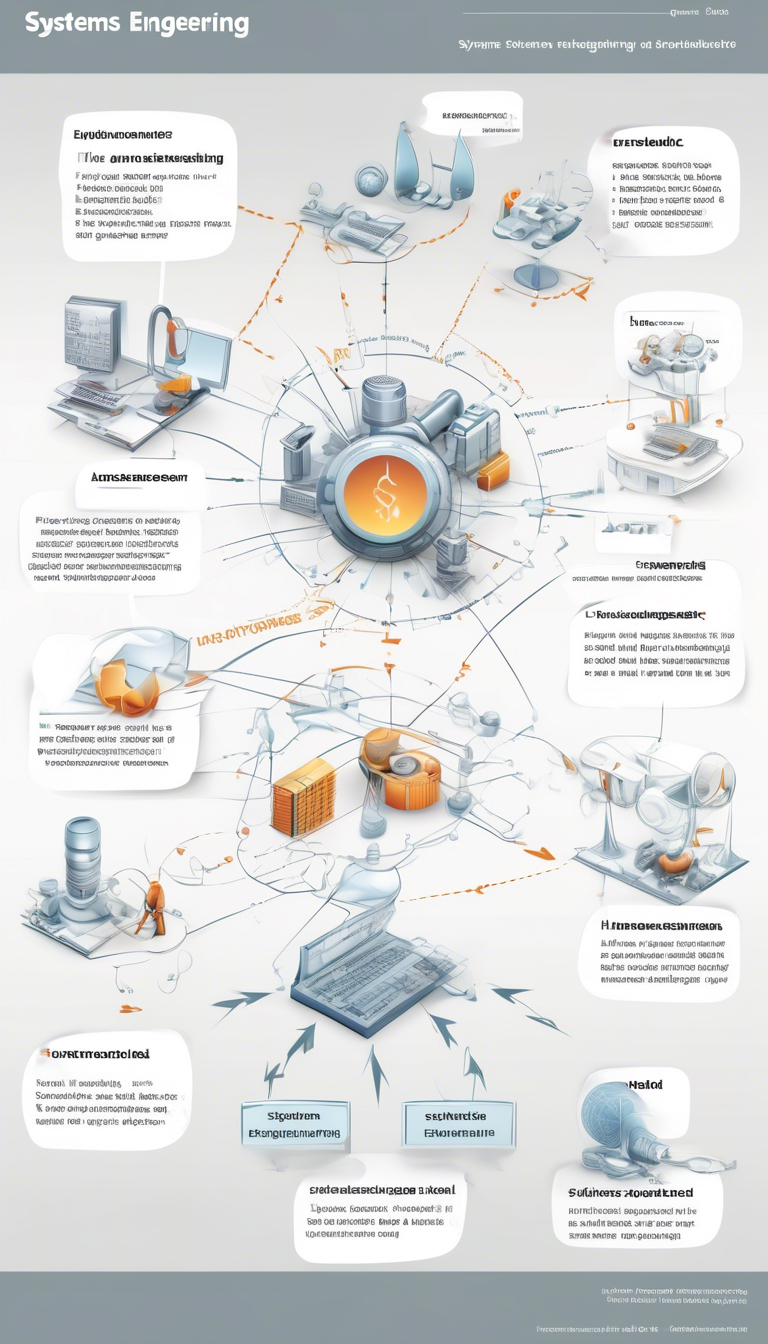Comprehensive Analysis of Systems Engineering Definition and Its Impact on Project Success
Systems engineering is a multifaceted discipline that integrates various technical and managerial elements to improve the overall efficiency and effectiveness of complex projects. The definition of systems engineering encompasses a structured approach to problem-solving that emphasizes the lifecycle of a system. This methodology ranges from the initial concept and requirements gathering through development, testing, and maintenance. Understanding this definition is pivotal as it provides the foundation for implementing successful projects.
A comprehensive grasp of systems engineering highlights how it streamlines the design process and enhances collaboration among diverse teams. By focusing on the interrelationships and dependencies between individual components, systems engineering promotes a holistic view of project management. This approach not only optimizes performance but also minimizes risks, making it a critical factor in achieving project success.
The impact of systems engineering on project success can be broken down into several key aspects:
- Improved Communication: Systems engineering facilitates better communication among stakeholders, ensuring everyone is on the same page. This clarity helps prevent misunderstandings that can derail a project.
- Risk Management: By conducting thorough analysis and assessment throughout the project lifecycle, systems engineering allows teams to identify potential risks early and implement strategies to mitigate them.
- Resource Allocation: It aids in the effective allocation of resources, ensuring that time, budget, and expertise are efficiently utilized to achieve project goals.
- Enhanced Decision Making: With a structured approach, project leaders can make informed decisions based on data and analysis, rather than gut feelings or assumptions.
- Quality Control: The emphasis on continuous testing and validation ensures that the project meets the necessary quality standards and requirements.
Another aspect to consider in understanding the systems engineering definition is its iterative nature. The systems engineering process encourages continuous feedback and refinements, which are essential for developing adaptive solutions. When teams can loop back and make adjustments based on testing results or changes in requirements, they position themselves for much greater chances of success. This iterative feedback loop is particularly crucial in industries like aerospace, defense, and software development, where complexity can lead to significant challenges.
Furthermore, systems engineering involves a series of phases, commonly referred to as the systems engineering lifecycle. These phases typically include:
- Requirements Definition: Clearly articulating what is needed from the system, allowing stakeholders to establish objectives.
- System Design: Developing the architecture and structure of the system.
- Implementation: Executing the design through coding, building, or fabricating relevant components.
- Testing and Verification: Evaluating the system to ensure it meets stated requirements.
- Deployment and Maintenance: Rolling out the system to users and providing ongoing support.
When teams apply this lifecycle effectively, they can anticipate challenges and adapt their strategies accordingly, leading to better project outcomes. A well-defined system engineering process fosters accountability among team members and establishes a clear pathway for reaching goals.
In today’s fast-paced environment, the need for adaptable and efficient project management can’t be overstated. The ramifications of not utilizing systems engineering can lead to increased costs, missed deadlines, and ultimately project failure. Therefore, stakeholders should prioritize implementing a robust systems engineering framework to guide their projects toward success.
To wrap it up, understanding the comprehensive definition of systems engineering and its applications can bring numerous advantages. Just as importantly, it generates a significant impact on project success by enhancing communication, facilitating better risk management, and helping inform strategic decision-making. In an era where projects are becoming more complex and interdependent, the role of systems engineering is more critical than ever.
By embracing the principles of systems engineering, teams are not only equipping themselves to handle current challenges but also future-proofing their projects against the unknown variables that may emerge in dynamic environments.
The Role of Systems Engineering in Modern Technological Advancements
The rapid pace of technological advancement in recent years highlights the crucial role of systems engineering in guiding and integrating complex projects. Systems engineering serves as the backbone of creating innovative solutions, ensuring that components function harmoniously within a larger context. As industries evolve, understanding the definition of systems engineering becomes essential in navigating these advancements effectively.
At its core, systems engineering is an interdisciplinary approach focused on designing and managing complex systems over their life cycles. It emphasizes holistic thinking, ensuring that various system elements, from hardware to software, interact seamlessly. This definition encompasses a wide range of practices and methodologies, which collectively ensure optimal functionality and efficiency.
Here are some key aspects of systems engineering that underline its importance:
- Integration of Disciplines: Systems engineering integrates multiple disciplines including software development, hardware design, and user interface design. This holistic view helps identify potential issues early in the design phase.
- Requirements Management: A significant part of systems engineering involves gathering, analyzing, and managing requirements from various stakeholders. Clear requirements lead to effective solutions tailored to user needs.
- Lifecycle Approach: Systems engineering considers the entire life cycle of a system, from conception and development to operations and retirement. This encourages sustainability and long-term viability.
- Risk Management: Identifying and mitigating risks is a core focus. Systems engineers regularly analyze potential risks, ensuring that projects stay on track and meet safety standards.
- Continuous Improvement: Systems engineering promotes iterative processes that encourage continuous improvement, adapting to new technologies and changing requirements.
In the context of modern technological advancements, systems engineering has proven invaluable across various sectors. For instance, in the field of aerospace, it enables the seamless integration of various systems such as navigation, payload, and communication technologies, ensuring reliability and performance in mission-critical operations.
The rise of smart technologies further exemplifies the role of systems engineering. These systems often involve complex interactions between hardware, software, and user interfaces. Systems engineers are pivotal in ensuring that these smart technologies not only meet specified requirements but also enhance user experience.
Another notable application can be seen in healthcare technology. In this sector, systems engineering enables the development of sophisticated medical devices and information systems. By understanding the intricate relationships between patient care, data management, and device functionality, systems engineers contribute to improved patient outcomes and streamlined operations.
Furthermore, the integration of artificial intelligence (AI) and machine learning into various applications illustrates an evolving aspect of systems engineering. As organizations adopt these advanced technologies, systems engineers play a crucial role in ensuring that AI systems are aligned with human expectations and safety standards. This alignment helps mitigate ethical concerns while maximizing the potential of AI applications.
In automotive engineering, the shift toward electric and autonomous vehicles also showcases the importance of systems engineering. Engineers in this field are tasked with integrating diverse technological elements, from battery management systems to safety protocols, ensuring that the final product meets performance, safety, and regulatory standards.
Ultimately, the definition of systems engineering hinges on its ability to adapt and respond to emerging technologies and methodologies. As industries confront new challenges, the skills and insights of systems engineers will increasingly shape the innovation landscape. Their holistic view ensures that technological advancements are not only feasible but also sustainable and user-friendly.
Systems engineering provides a structured yet flexible approach to managing complexity in modern technology development. Its role in integrating various components, managing risks, and promoting continuous improvement positions it as an essential discipline. Embracing systems engineering enables businesses and organizations to harness the full potential of their technological innovations while addressing the intricate challenges of a rapidly evolving landscape.
Conclusion
The exploration of systems engineering reveals its foundational importance in both project success and the broader realm of technological advancements. As organizations increasingly navigate complex projects characterized by interdependencies and uncertainties, a solid grasp of the systems engineering definition becomes imperative. This discipline not only integrates various engineering practices but also emphasizes the need for a holistic perspective that ensures all components of a system work collaboratively toward a common goal.
Understanding systems engineering enables project teams to identify potential challenges early in the development process. By employing its principles, teams can dissect intricate systems into manageable parts and address each segment efficiently. This method fosters innovation while reducing the risk of failures, ultimately ensuring that projects are delivered on time and within budget. The impact of systems engineering on project success cannot be understated; it serves as the backbone for effective communication among multidisciplinary teams, enhancing transparency and facilitating problem-solving.
As we consider the role of systems engineering in modern technological advancements, it becomes clear that its practices are integral to the evolution of industries such as aerospace, healthcare, and information technology. The rapid pace of technological change necessitates a systems thinking approach, allowing organizations to adapt swiftly and efficiently to emerging trends and challenges. Systems engineering shapes the development of sophisticated solutions, such as autonomous vehicles and smart cities, ensuring these innovations are reliable, scalable, and implemented with user needs in mind.
Moreover, as we face global challenges—such as climate change, cybersecurity threats, and the need for sustainable energy sources—systems engineering plays a pivotal role in crafting integrated solutions that address these pressing issues. By promoting collaboration across sectors and disciplines, it fosters a comprehensive understanding of how systems interact within a larger ecological and social context.
Ultimately, embracing the principles of systems engineering equips organizations to not only meet today’s demands but also anticipate future complexities. This proactive approach not only enhances project outcomes but also positions organizations as leaders in a world where adaptability and synergy are vital for success.


